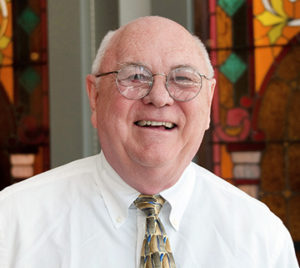Nineteenth Sunday in Ordinary Time
August 12, 2018

Readings:
First Reading: 1 Kings 19:4-8, 12-15
Psalm 34: 2-3, 4-5, 6-7, 8-9
Second Reading: Ephesians 4:30-5:2
Gospel: John 6:41-51
Who’s In Control?
“I’m in control here!” These are the famous or infamous words that Secretary of State Alexander Haig blurted out on the day of the assassination attempt on President Ronald Regan, March 30, 1981. He was wrong, of course. According to the US Constitution, if the Vice-President would be unavailable in such a crisis — and that was the case here with Vice-President Bush in a plane over Texas and not in secure voice contact — the succession passed to the Speaker of the House and then the President pro-tem of the Senate, not to the Secretary of State. That mistake exposed Haig to a great amount of ridicule, and ended any ideas that he was fit for the presidency.
“I’m in control here!” are words not said exactly in today’s readings, but they could have been.
Elijah had had it. He had shown zeal for the Lord in exposing the prophets of Baal and in killing them all, and now Queen Jezebel was after his head. So he fled into the desert and just wanted to die. If he had been in control that’s what he would have liked: call it quits; just die. But God had other ideas, and of course God was the one in control. God had other things for Elijah to do, and so God fed Elijah to make him strong, and Elijah walked forty days and forty nights through the desert to Mt. Horeb. Our reading today doesn’t tell us what happened there, but once at Horeb, Elijah had a deep experience of God’s presence and a renewed sense of his vocation to be a prophet. Elijah was not in charge. God was, and called Elijah to mission.
The people in the gospel could also have talked about being in control. Who was this Jesus anyway? How could he talk about himself as bread coming down from heaven? We know who he is. He’s the son of Joseph and Mary! We know all about him! But God had other ideas, and, of course, God was the one in control. If they had only stopped murmuring and really listened to him, though, they would have been surprised. They would have been nourished. They would have found new life. Like Elijah, they would have found strength in Jesus — the living bread-to walk through life with vigor and conviction. Unlike Elijah, though, they refused to eat. They thought they were in charge.
The Ephesians might have thought that they were in charge too. That’s why Paul warned them not to grieve the Holy Spirit with which they had been sealed at baptism. If they persisted in focusing on their own selves and their own grievances — their bitterness and fury, being angry, shouting at one another, reviling each other, not forgiving one another — they would have been in charge. But they would also not be nourished by the bread of life. If they would be forgiving and compassionate and kind, they would taste the goodness of the Lord. They wouldn’t be in control, but then the Spirit would, and they would discover what it means to really live.
What about us? Do we think we are in control? Do we just want to give up? Do we think we really know the people we live with? Are we content with nursing old grudges towards others? Or do we want to feed on the bread of life, bread that is “for the life of the world,” the bread that will call us, like Elijah, to mission (being better parents or spouses, better community members, being open to share with the poor, being more responsible for our earth)? Do we want to open up to the Spirit, who will lead us to new places in our lives (new ideas about our faith, trying a new form of prayer, taking a new look at migrants, opening up to a friend, committing ourselves to learn more about human trafficking)?
When we are in control of our lives we will most likely survive. We’ll be comfortable. But will we really live? Let’s not grieve the Spirit!
Stephen Bevans, SVD
Louis J. Luzbetak, SVD Professor of Mission and Culture, Emeritus